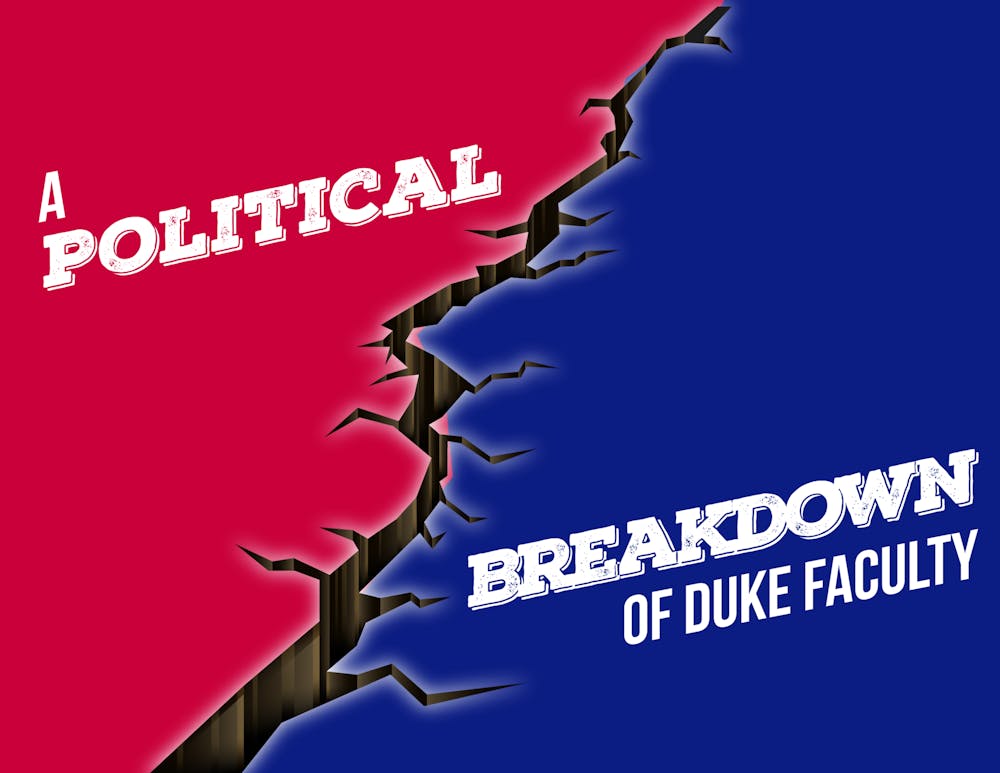Editor's note: This story is part of a series based on a survey of Duke faculty conducted by The Chronicle. You can read more about our methodology and limitations here, or read all of our survey coverage here.
For its first year, The Chronicle surveyed Duke faculty members about their political identities.
While faculty respondents tended to be liberal overall, the disaggregation of the data by field and school revealed variation in political views.
A deeper dive into faculty political leanings
When asked for their political identities on a scale of “very liberal” to “very conservative,” 23.2% of respondents identified as “very liberal,” 38.53% identified as “somewhat liberal,” 24.48% identified as moderates or centrists, 9.92% identified as “somewhat conservative” and 3.87% identified as “very conservative.”
Faculty political leanings are mostly aligned with national trends on political identification. Female respondents were more likely than male respondents to be liberal. From least to most liberal among categories with more than 30 respondents, the order was: Asian (57.61%), white (62.44%), Hispanic/Latinx (62.86%), Black or African American (67.86%). You can view the full disaggregations of the data by race, gender and religion on Tableau.
Comparisons with other universities and studies
The most recent comprehensive survey of U.S. professors was conducted in 2007 by Harvard Professor Neil Gross and George Mason University Professor Solon Simmons. More recently, Nicholas Havey, a doctoral candidate in the department of education at the University of California, Los Angeles, published a report using preliminary data from professors’ Twitter accounts to assess their political ideology.
Duke faculty respondents tended to be more moderate compared to those in either of the previous studies. The comparison to Gross and Simmons’ study should be taken with caution, given it was conducted 17 years ago.
In the Harvard Crimson’s spring 2023 faculty survey, 31.8% of respondents drawn from Harvard Faculty of Arts and Sciences and the John A. Paulson School of Engineering and Applied Sciences identified as “very liberal,” while 45.3% of respondents identified as “liberal.” Fewer than 3% of respondents identified as “conservative” (2.5%) or “very conservative” (0.4%). The Crimson also conducted a survey in 2022 with similar results.
Compared to Duke faculty respondents from the Trinity School of Arts & Sciences and the Pratt School of Engineering, Harvard faculty members tended to be more liberal and less moderate or conservative.
The Buckley Institute, an organization “dedicated to promoting intellectual diversity and free speech at Yale,” recently analyzed faculty voting records in its 2024 Report on Faculty Political Diversity. Out of 1,511 total faculty “across 27 undergraduate degree-granting departments and programs and the law school,” the institute found that 77% of faculty are registered as Democrats “or have conducted political activity that heavily or exclusively supports Democrats” and 3% are Republicans. Voter registration does not always align with political ideology — for example, someone may hold liberal views while being unaffiliated with either major political party.
Disaggregation of political leaning by tenure status and school
When disaggregated by tenure status, the ranges of political self-identification, from most to least liberal, were as follows: part-time and non-tenure-track (52.63%), tenured (56.2%), another tenure status (58.83%), tenure track (59.26%) and full-time and non-tenure-track (68.21%). The ranges of political self-identification, from most to least conservative, were as follows: another tenure status, tenure track, part-time and non-tenure-track, tenured and non-tenure-track and full-time.
Get The Chronicle straight to your inbox
Sign up for our weekly newsletter. Cancel at any time.
Across schools with at least 15 respondents, faculty members affiliated with the School of Nursing were most likely to be liberal, while Fuqua School of Business faculty members were least likely to be liberal. Faculty members from the Pratt School of Engineering were most likely to be conservative, and Trinity School of Arts & Sciences faculty were least likely to be conservative.
When grouped by the three major fields of study on the Trinity website, faculty members affiliated with the arts and humanities were most likely to be liberal and least likely to be conservative. Faculty members affiliated with the social sciences were most likely to be conservative and least likely to be liberal.
Four out of the nine respondents in the social sciences who identified as conservative were affiliated with the economics department. Even without respondents from the economics department, Trinity respondents affiliated with the social sciences were still most likely to be conservative and least likely to be liberal.

Audrey Wang is a Trinity senior and data editor of The Chronicle's 120th volume. She was previously editor-in-chief for Volume 119.

